BioE’s Carlos Renteria: Passionate About Education, Curing Alzheimer’s, and Outreach— Particularly Exposing Hispanics to STEM
October 27, 2017
The more you learn, the more you can do. – Carlos Renteria
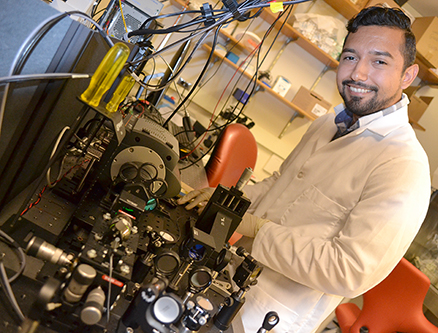
BioEngineering PhD student Carlos Renteria
This was the attitude Carlos Renteria’s dad instilled into him growing up. And it appears to have worked. Currently a PhD student in Bioengineering (BioE) and conducting research in Professor Stephen Boppart’s Biophotonics Imaging Lab, Renteria dreams of becoming a university professor to both teach and do research. And while he’s worked hard to get to where he is today—studying for a Ph.D. at a top engineering school— Renteria says he owes a lot of it to his dad.
“My dad was a very strong influence in terms of instilling education values in me. He really emphasized doing well in school and getting involved. The more you learn, the more you can do,” he emphasizes.
Born and raised in Phoenix, Arizona, Renteria was a first-generation 4-year college graduate. His dad had gotten a community college degree, but wasn’t able to get a Bachelor’s in Architecture like he’d hoped. “I was the first to get a bachelor’s degree,” Renteria explains.
While he thought science was cool growing up, Renteria had actually hoped to fulfill his dad’s dream: “I wouldn't say it [science] was something I was super invested in as a little kid. I actually wanted to be an architect growing up.”
It wasn't until his sophomore year of high school, during a biology class, that the light bulb went off. “I learned to love biology,” he reports. So during his junior and senior year, he was part of the IB (International Baccalaureate) program. Similar to AP courses, it also includes creativity, action, and service portions that encourage involvement and leadership; plus students who score high enough on specific courses can receive college credit for those.
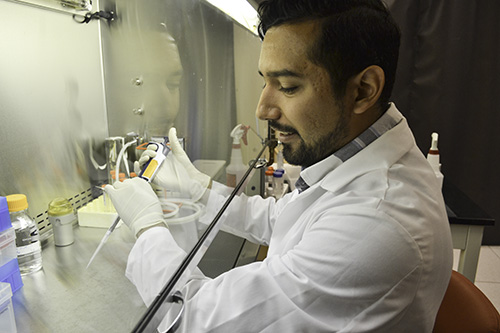
Above and below: Carlos Renteria at work in Professor Stephen Boppart's lab.
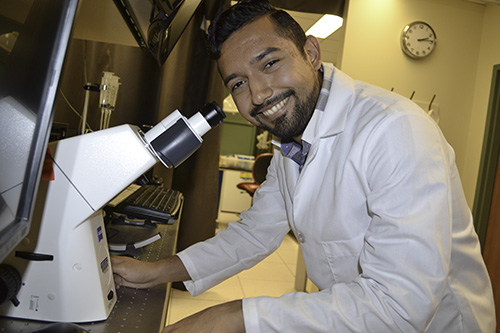
Other role models who impacted him significantly, in addition to his dad, were his teachers; he had really great biology and math teachers who encouraged him towards STEM. “I feel like they really had a passion for what they were teaching, and that kind of made me realize some of my strengths as well. I realized that I really enjoyed mathematics, and I felt like it was important for me to join a field that was pretty math intensive. So I kind of discovered biomedical engineering.”
Renteria reports that he had been most interested in imaging when he found out about biomedical engineering, and after learning about all the sub disciplines, he settled on bioimaging. “I thought that imaging was a very cool aspect of it that incorporated my desire to apply engineering principals and fundamentals via imaging to study and understand certain biological phenomena.”
And one of the biological phenomena he’s interested in? Alzheimer's.
His grandfather had it when Renteria was growing up, and he’d like to find a cure for it. So one of his research interests is neurodegenerative diseases, and he admits that he hopes to find a cure for some: “Finding ways to alleviate those symptoms and potentially work your way to a cure, is what I would ideally like to do. There are a lot of neurodegenerative diseases, and there's a lot of neurodegeneration that occurs as people get older. Studying things like that can be very beneficial for learning what we can do about them.”
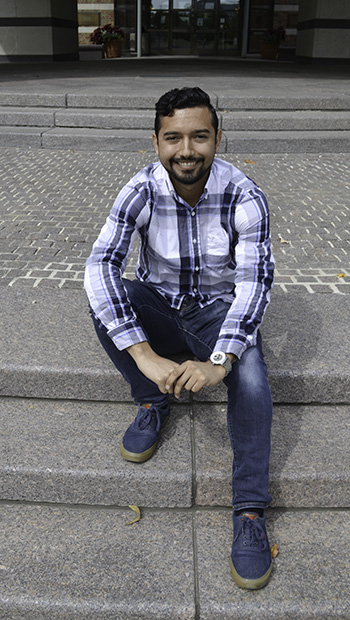
Carlos Renteria in front of Beckman Institute.
While he’s never taken any coursework about the brain, he has done a lot of independent research on it. And while he does plan to take a course in neuroscience in the future, he also hopes to use engineering to help him learn more about the disease. “I felt like establishing the engineering fundamentals is very important, so that you develop the technologies and technique to study the specific thing you may be looking at. I feel like that’s a good foundation to have in order to study specific things.” Once he learns more about those, he hopes to have “a better appreciation for the field.”
So it was his dream of curing Alzheimer’s that has primarily set his trajectory over the last several years. Deciding that the MRI could help solve Alzheimer’s, as an undergrad in Arizona, he worked in the Prognostic Bioengineering Lab, which was involved in imaging research. There he developed an algorithm to co-register immunohistochemically-stained images with anatomical MR images. While the research at the lab was cancer focused, he felt the image processing fundamentals and skill sets would apply to other imaging techniques.
And they have. The image processing learning he gained from his initial undergraduate research opportunity gave him a solid fundamental understanding of a lot of the underlying math. Plus, it led him to participate in Illinois’ 10-week Bioimaging REU. During the REU, he not only got to focus solely on research for the whole ten weeks, but it also gave him insight into what graduate school would be like. While he had done research at Arizona State, he had primarily been focused on doing course work with a little bit of research. The REU was his first glimpse into what it would be like to mostly focus of research, which, he says, “was a lot different than what I had at first anticipated it would be.” He calls it “still busy, but…a different kind of busy.” Even now, though he’s taking course work in graduate school, he reports that he’s mostly reading papers or analyzing data.
Plus, the Bioimaging REU not only further cemented Renteria's love of imaging; it also set his course for the next six or so years of his life: seeking a PhD in Bioengineering at Illinois while conducting research in Stephen Boppart’s lab.
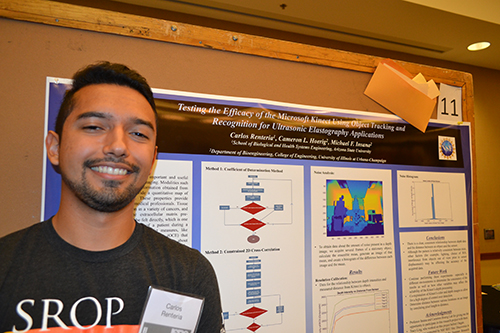
Carlos Renteria presents his research at the 2015 Illinois Summer Research Symposium as a Bioimaging REU participant.
While he's still doing his independent Alzheimer's research (readings he's done whenever he gets the chance), he says it's changed since coming to Illinois. Before, he had done a generic overview of it and the behavioral outcomes of the disease. This past year, however, he actually started focusing on what was actually going on with the disease. He wrote a paper on Alzheimer’s for a class last semester, and after reading a lot, “discovered some underlying molecular issues and proteins associated with the disease, and how the neurodegeneration starts. It wasn't until then that I had a better idea for what was going on.”
"That class project helped me understand a lot of the mechanisms behind the disease, which I believe will be helpful as I pursue my scientific career," he adds.
Has Renteria pretty much determined that he will research Alzheimer’s for his dissertation?
“No. Yes and no,” he prevaricates. He’s also become intrigued by the idea of studying the retina and photoreceptors, and may combine them with his earlier passion. Seeking the best of both worlds, he says, “There are some things you can study in the retina that are also related to Alzheimer's and other neurodegenerative diseases.”
Renteria believes that the imaging research that he's currently conducting in Boppart's lab will help elucidate information about the brain, and the retina, and he hopes to use them as techniques to study the mechanisms of Alzheimer's and other neurodegenerative diseases as he progresses through his career.
Along with research, Renteria also wants to teach. He served as a TA last year for the first time, and learned a lot from that experience. “I realized how difficult it is, but it is also very rewarding. And after that, I realized I did want to teach a little more, because I think education is one of the most valuable things that we can have. That was a value that I got from my dad.”
He would specifically like to teach people about signal imaging and processing. “I really think that having a good educator is very valuable,” he admits. “I feel like being able to get my skill set in teaching better, I could potentially make an impact on someone’s life.”
When Renteria was in high school, did he ever think he would be where he is today?
“No, I didn't,” he admits. “I didn't want to be a professor in high school. I didn't want to teach. I didn't want to do research. I just eventually got here.” Over the past several years, he’s gradually sharpened his focus; at one point he'd considered doing clinical research with an industrial focus rather than an institutional focus, and at another was thinking about making medical devices. “So I was all over the place where my career interests were, and I eventually found myself here. And I like where I am.”
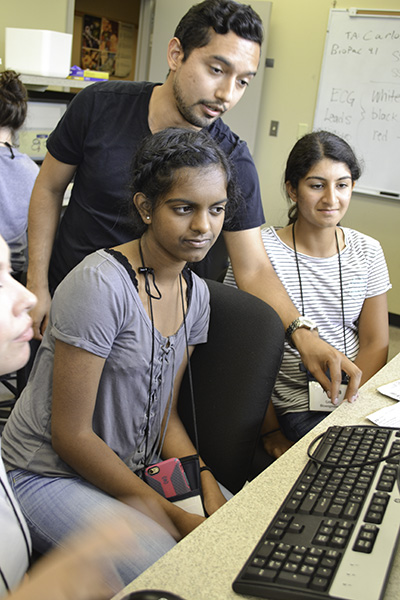
Carlos Renteria (center) works with BioEngineering GAMES camp participants during one of the sessions he taught.
“I am really happy that I ended here,” Renteria adds. “I owe a lot to everyone who has taught me and educated me. I am very grateful and thankful.”
Along with curing Alzheimer’s and researching the Retina, another passion of Renteria’s is outreach. For instance, this past summer, he did the BioE GAMES camp, BioE’s Exploring Your Options in Engineering camp, and another. He says he got involved in outreach as a TA last year:
“I decided that this sounds really fun,” he admits, “and this is something I was to do.” So he got involved in hopes of giving back to the community.
“I feel like it’s important as an academic to give back in whatever way you can. Education is something I really value,” he acknowledges “I would like to not just teach and do research, but being able to reach out to groups of people or students and get them interested in science and engineering is a key core of what I want to do in the future.”
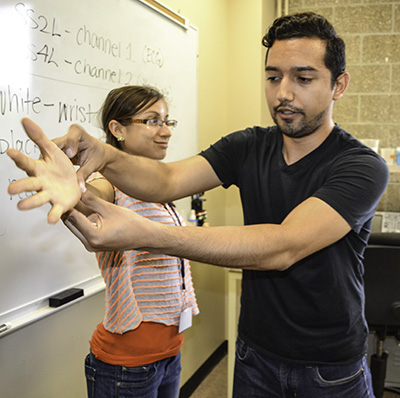
During a BioE GAMES 2017 biomeasurement activity, Renteria demonstrates how to student how to attach a biosensor to a teammate.
Coming from a Hispanic background, he also hopes to impact the number of Hispanics in STEM fields. He reports that the percentage of Hispanics enrolled in college is smaller than other demographics, and the higher one goes in education, the larger the discrepancies.
“Being able to make those discrepancies smaller is near and dear to my heart.” So he hopes that outreach activities that target those specific demographics, such as Hispanics, might help to make those discrepancies smaller. “That way there's a lot more diversity in the STEM fields,” he concludes. “Doing research and teaching is cool and great, but at the end day, you want others to get interested after you're gone. Outreach is getting people interested.”
Story by Elizabeth Innes, Communications Specialist, I-STEM Education Initiative.
For more related stories, see: BioE, GAMES, GAMES: BioE, Grad, REU, REU: Bioimaging, Student Spotlight, Underserved Students/Minorities in STEM, 2017
For additional I-STEM articles about the activites Carlos has participated in previously, see:
- BioE GAMES Campers Are Exposed to Bioengineering, Engineering's Grand Challenges, & Encouraged to Stay in STEM (2017)
- REU Undergrads Experience Research, What Graduate School Is Like (2015)
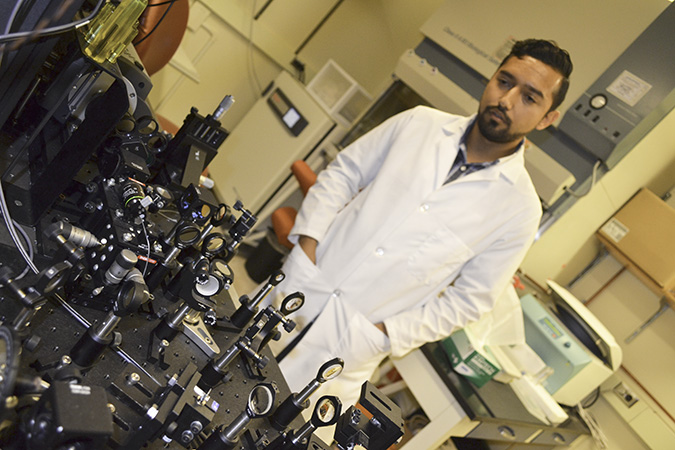 Above: Renteria by some of the imaging paraphernalia in the lab.
Above: Renteria by some of the imaging paraphernalia in the lab.Below: Renteria prepares to demonstrate how to put sensors on a labmate to the high schoolers participating in the Bio-E GAMES camp.
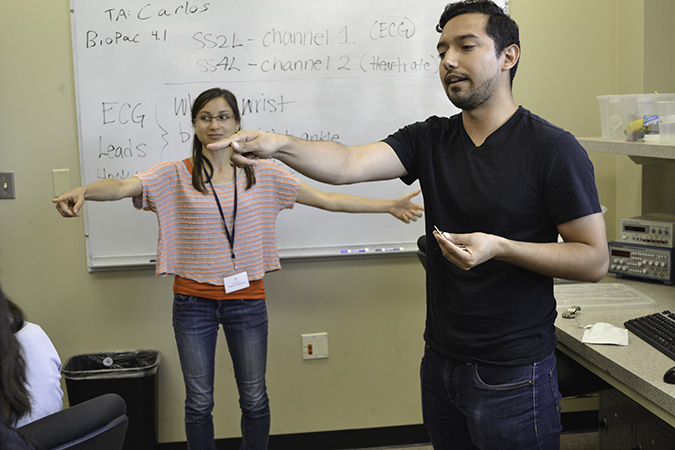













.jpg)
















